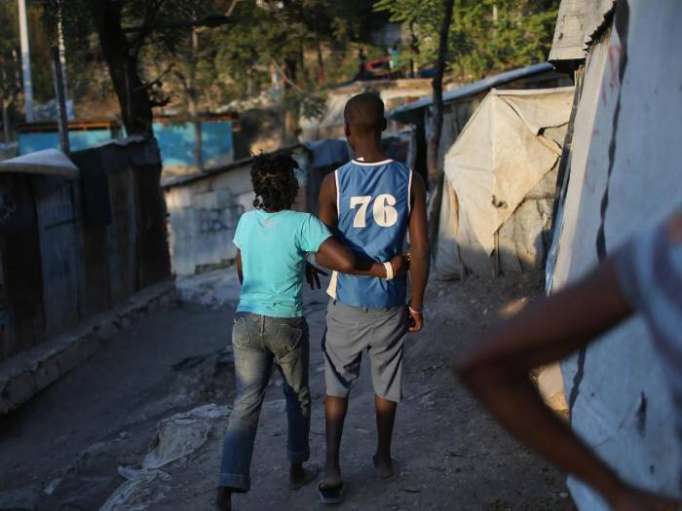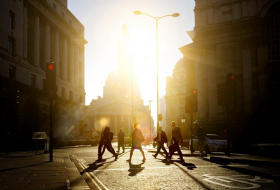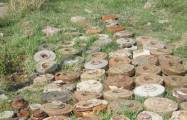Children as young as six were being coerced into sex in exchange for food and necessities, according to a damning report by Save the Children, which called for urgent action including the creation of a global watchdog.
Its research exposed abuse linked to 23 humanitarian, peacekeeping and security organisations operating in Haiti, Ivory Coast and what was then Southern Sudan.
“Our own fieldwork suggests that the scale of abuse is significant,” the report concluded. “Every agency is at risk from this problem ... existing efforts to keep children safe from sexual exploitation and abuse are inadequate.”
It identified “every kind of child sexual abuse and exploitation imaginable”, including rape, prostitution, pornography, sexual slavery, assaults and trafficking.
One 15-year-old girl in Haiti told how “humanitarian men” exposed themselves and offered her the equivalent of £2 to perform a sex act.
“The men call to me in the streets and they ask me to go with them,” said another Haitian girl. “They do this will all of us young girls.”
A six-year-old girl described being sexually assaulted and a homeless girl was given a single US dollar by a “man who works for an NGO” before being raped and severely injured, while boys were also reportedly raped.
When asked why the abuse was not reported, children said they feared losing aid, did not trust local authorities, did not know who to go to, felt powerless or feared stigma and retaliation.
“The people who are raping us and the people in the office are the same people,” said one girl in Haiti.
Several children said they knew of cases where international aid workers had left the country while wanted by police, or where abusers had been disciplined or assigned to a different post.
The research took place in 2007, when Haiti was experiencing a food crisis driven by rocketing prices, natural disasters and climate change.
It was three years before the alleged sexual misconduct by Oxfam staff that has sparked national outcry and demands for change.
Corinna Csaky, who wrote the report, said an advance copy was sent to the CEO of Oxfam and all major international NGOs, adding: “In our cover letter we emphasised that our research revealed a sector wide problem but we didn’t implicate any one particular organisation by name.”
“The most important thing you can do to stop this happening is to invest in those communities,” she told The Independent.
“Yes, you can have your code of conduct and policies and enforcement mechanisms but child protection is about educating women and girls about their rights, about knowing where to get help if you feel under threat, what is reasonable and what you can say no to.
“It’s the environment that makes abuse possible.”
Ms Csaky, a global child development adviser who no longer works for Save the Children, said that the charity was receiving “anecdotal” reports of sex abuse in the field more than a decade ago.
“It basically got to a stage where we thought ‘we need to find out more – how widespread is this?’” she added.
“What I found surprising was that it was a problem for every organisation, regardless of what they delivered, what kind of organisation they were.
“It was something everybody needed to take seriously and on a personal level just the sheer age of some of the victims, the lack of recourse and the sense of total and utter powerlessness on the part of them and their communities was shocking.”
Ms Csaky declined to name the 23 organisations implicated but said they were across the “full spectrum” of aid agencies, NGOs, peacekeeping forces and UN agencies.
“We organised events to talk about these issues and the solutions where all of these donors and implementers were parts of those conversations,” she added, saying the report sparked meetings and reforms within the UN.
It called for effective local complaints mechanisms for victims to combat “chronic underreporting”, a new global watchdog to monitor the international response and for governments to prioritise tackling the root causes of abuse.
A spokesperson for Oxfam said: “As a result of the Save the Children report, a senior member of Oxfam staff visited Haiti to assess the situation for himself and measures were put in place.
“However, these measures proved insufficient and could have been compromised by staff who were were later investigated by Oxfam and found guilty of misconduct.”
The British Government has demanded “absolute assurances” that all British charities operating abroad are protecting vulnerable people and referring complaints to authorities in the wake of revelations about Oxfam.
The Charity Commission has launched a statutory inquiry and the International Development Secretary, Penny Mordaunt, said Oxfam had agreed not to bid for new government funding until her department “is satisfied that they can meet the high standards we expect”.
“We want to ensure that programmes we are already financially committed to are being delivered appropriately by Oxfam or any other Dfid partner,” Ms Mordaunt said.
“Clearly Oxfam have a long way to go before they can regain the trust of the British public, their staff and the people they aim to help. The actions and attitude of the organisation over the coming weeks will be critical.
“I am determined that we do our utmost to prevent exploitation and abuse happening – and ensure that where it does happen it is identified and dealt with appropriately.”
Oxfam has pledged to publish an internal investigation it mounted in 2011 over allegations of sexual and other misconduct in Haiti, which resulted in several members of staff being sacked and others including the country director resigning.
As part of a plan to “stamp out abuse”, the charity is launching an independent review of its culture, creating a global database of accredited referees.
The reforms include more than doubling the number of people working in safeguarding while increasing annual funding to £720,000.
“What happened in Haiti and afterwards is a stain on Oxfam that will shame us for years, and rightly so,” said Oxfam International’s executive director, Winnie Byanyima.
“Right now I have two utmost priorities for Oxfam: continuing to provide support to the millions of vulnerable people we work with around the world, and learning vital lessons from our past mistakes to make sure such abuse and exploitation does not happen again.”
Oxfam GB’s chief executive Mark Goldring, who has resisted pressure to resign, said the charity had “betrayed people’s trust” and would work with the Government, the Charity Commission and others to reform.
More than 1,000 direct debits to the charity were cancelled over the weekend and the Government threatened to cut £31.7m annual public funding for Oxfam.
A report released on the future of international NGOs last year warned that they were being threatened by the actions of national governments delegating the response to increasingly “politicised” crises to their own agencies and militaries.
Andrew MacLeod, a former UN official, told The Independent the outrage sparked by the Oxfam scandal could be a “sustained turning point for change”, adding: “This isn’t an excuse to cut aid, this is an excuse to fix aid.”
Mr MacLeod, who represents a charity targeting sexual abuse by UN agencies, said: “It’s taken nine years to get to this point where we’re getting some change peacekeepers but the problem is far bigger than that ... this is an opportunity to reform the charity sector completely and permanently.”
More about: Oxfam
















































